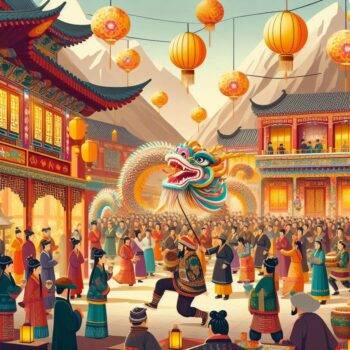
Immersing yourself in cultural events is one of the most rewarding ways to experience China’s rich heritage, connect with locals, and gain deeper insights into the traditions of this fascinating country.
From traditional Chinese festivals to modern art exhibitions and performances, attending these events as a foreigner can provide both excitement and a cultural learning curve.
This guide will help you navigate and fully enjoy cultural events in China, with practical tips, cultural insights, and useful resources.
Understanding the Importance of Cultural Events
China’s cultural events are deeply rooted in history, symbolism, and community spirit.
Whether it’s the vibrant celebrations of the Lunar New Year or the solemn reverence of Qingming Festival (Tomb-Sweeping Day), each event offers a glimpse into the country’s diverse traditions.
Participating in these occasions as a foreigner is an excellent way to break barriers, foster friendships, and appreciate the cultural tapestry that makes up modern-day China.
Key Chinese Cultural Events
| Festival/Event | Date (Lunar Calendar) | Significance |
|---|---|---|
| Lunar New Year (Spring Festival) | 1st day of the 1st lunar month | Family reunions, honoring ancestors, and welcoming the new year with good fortune. |
| Mid-Autumn Festival | 15th day of the 8th lunar month | Celebrates the harvest and family unity, with mooncakes as a central tradition. |
| Qingming Festival | April 4th or 5th | A day to honor ancestors by cleaning graves and making offerings. |
| Dragon Boat Festival | 5th day of the 5th lunar month | Commemorates the poet Qu Yuan with dragon boat races and zongzi (sticky rice dumplings). |
For a full list of festivals, visit China Highlights: Chinese Festivals.
Step 1: Research Events in Advance
Planning is key to making the most of cultural events in China. Here’s how to stay informed:
1. Use Social Media and Apps
Platforms like WeChat, Xiaohongshu, and Douban are excellent sources for event information. Follow official city accounts, local cultural centers, and expat groups for updates.
- WeChat: Search for public accounts like “Shanghai Events” or “Beijing Cultural Guide.”
- Xiaohongshu: A lifestyle app where locals share event reviews and tips.
- Douban: Great for finding niche events like art exhibitions or indie music performances.
2. Check Expat Websites and Forums
Websites like The Beijinger and Time Out Shanghai provide curated event listings, including festivals, concerts, and art shows.
3. Explore Local Event Venues
Museums, cultural centers, and theaters often host events showcasing local traditions or contemporary culture.
Check their official websites or social media pages for schedules.
Step 2: Learn Local Customs and Etiquette
Understanding cultural norms ensures you leave a positive impression and avoid accidental faux pas.
1. Dress Appropriately
- For traditional festivals or temple events, wear modest attire (e.g., avoid shorts or sleeveless tops).
- For modern events like art galleries or concerts, casual attire is acceptable.
2. Respect Punctuality
Arriving late is considered disrespectful. Aim to arrive on time or slightly early.
3. Mind Your Behavior
- During ceremonies or performances, avoid talking or using your phone.
- Accept and give items (e.g., red envelopes) with both hands as a sign of respect.
For more on Chinese etiquette, visit China Travel Guide: Cultural Etiquette.
Step 3: Participate Actively
Engaging with the community will elevate your experience.
1. Learn Basic Mandarin Phrases
Knowing simple phrases can go a long way:
| Phrase | Pinyin | English |
|---|---|---|
| 你好 | Nǐ hǎo | Hello |
| 谢谢 | Xièxiè | Thank you |
| 多少钱? | Duōshǎo qián? | How much is it? |
| 我不懂 | Wǒ bù dǒng | I don’t understand |
For more phrases, try apps like HelloChinese or Duolingo.
2. Try Local Cuisine
Food is central to Chinese festivals. Don’t miss:
- Dumplings (饺子) during Lunar New Year.
- Mooncakes (月饼) during the Mid-Autumn Festival.
- Zongzi (粽子) during the Dragon Boat Festival.
3. Join Hands-On Activities
Many events feature participatory activities like calligraphy workshops, lantern-making, or lion dance performances.
These are great opportunities to connect with locals and learn more about the culture.
Step 4: Navigate Practical Challenges
Attending events as a foreigner may come with unique challenges.
Here’s how to handle them:
1. Transportation Tips
- Public transportation can be crowded during festivals. Use apps like DiDi (China’s Uber) or Baidu Maps for navigation.
- For intercity travel, book train tickets in advance via 12306 China Railway.
2. Buy Tickets Ahead of Time
Popular events often sell out quickly. Use platforms like Maoyan or Damai to secure tickets.
3. Stay Informed About Rules
Some events have specific rules, such as no photography or strict seating arrangements. Check event details in advance to avoid mishaps.
Step 5: Expand Your Cultural Horizon
China’s cultural events extend beyond festivals. Consider exploring:
| Experience | Examples |
|---|---|
| Theater Performances | Beijing opera, Kunqu opera, or modern dramas. |
| Art Exhibitions | Calligraphy displays, contemporary art in Shanghai’s M50 district. |
| Music Festivals | Traditional Chinese instrument concerts or modern music fests in Chengdu. |
For more ideas, check out China Culture.
Final Thoughts
Attending cultural events in China as a foreigner is more than just entertainment; it’s an avenue for meaningful cultural exchange and personal growth.
With some research, preparation, and an open mind, you can turn these experiences into cherished memories.
Start small, stay curious, and immerse yourself in the vibrant world of Chinese culture.


